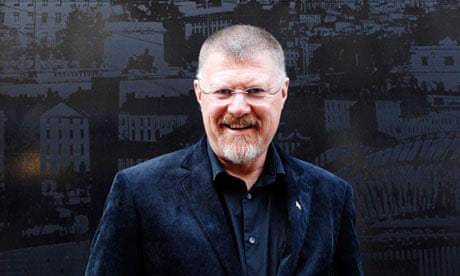Born in 1958, Deon Meyer is one of South Africa's top thriller authors. A former brand strategist for BMW motorcycles, he started writing full-time in 2008. His novels, which he writes in Afrikaans, are translated into 25 languages and have won him awards from around the world. His latest, 7 Days, stars his recurring character Detective Benny Griessel.
What gave you the idea to have Griessel racing against time to solve an old case, after the police are told they will be picked off one at a time by a sniper, every day until the murderer is arrested?
I mostly follow the dictum "conflict is the mother of suspense", so I'll be looking at as many sources of conflict for the protagonists as possible within the parameters of verisimilitude. The cold case was the basis of the book; the sniper developed as a way to ratchet up the tension, and the pressure on Griessel. And as a novelist I am fascinated with the deadline, with the role of time as a mechanism to increase the tension.
Some might say that Griessel, your troubled but brilliant alcoholic detective, is a bit of a cliche. Was that a worry?
When I first wrote him, in Dead Before Dying, he was never supposed to become a major character. He was supposed to be the comic relief in a fairly dark book, but he had the knack of walking on to the page and making things happen. At the end of the book I realised I had to bring him back, if I could find a story that suited him. By then I had already created him as a bit of a cliche, so I had to work with that – I had to put a new and exciting spin on the typical cliche of a drunk cop. I thought: let's put him through the wringer. So his wife in Devil's Peak says he has a choice – if he wants to get his family back he has to stay sober.
Did you always want to write thrillers?
I always wanted to write, but I never thought in terms of genre. I always thought in terms of story, and still do. For me, the most important thing is to try to tell an entertaining story – let other people worry about what genre it is.
Why write in Afrikaans, when your English is so good?
Afrikaans is my mother tongue. I find writing difficult enough in my own language. English is a second language, so to find the exact right word is just that bit more difficult. I work through the English translation very thoroughly, though, to make sure it's a perfect reflection.
Your books are huge in South Africa and you are now becoming a bestseller in Europe as well. Is South Africa taking over from Scandinavia as the new home of crime fiction?
That would be glorious but I don't think it's going to happen. South Africa is just not as sexy a place as Scandinavia. People's perception of it is often contaminated by the bad news they see on television and in newspapers – it's never a fair reflection of the real South Africa.
You write that "Colour, everything revolved around colour, all the time, every which way you looked, it was there." Are your books a true reflection of South African society?
No – it's fiction. You amplify, you magnify, to serve the story. Crime fiction can never be a panoramic window on society, it can only be a small window with a restricted view.
As an Afrikaans writer, do you feel pressure to represent all sectors of South Africa?
I don't feel obliged to do it. Everything is in service of the story and there are certain realities – in the police force, they have people of all ethnicities working together, so just to have black or white cops would not be credible. It's all about verisimilitude. You have to create a world that's believable, that's close enough to the truth to be believed.

Comments (…)
Sign in or create your Guardian account to join the discussion